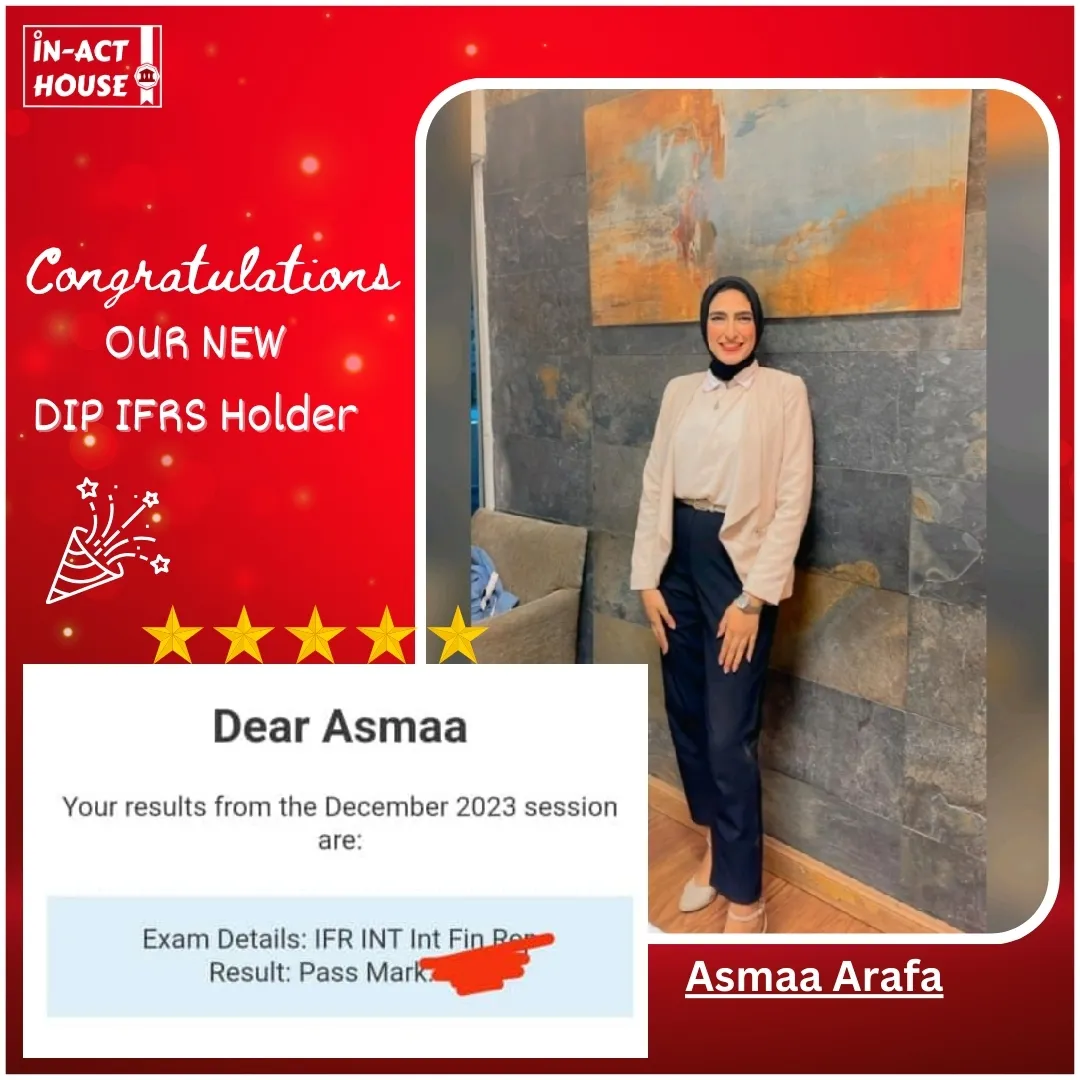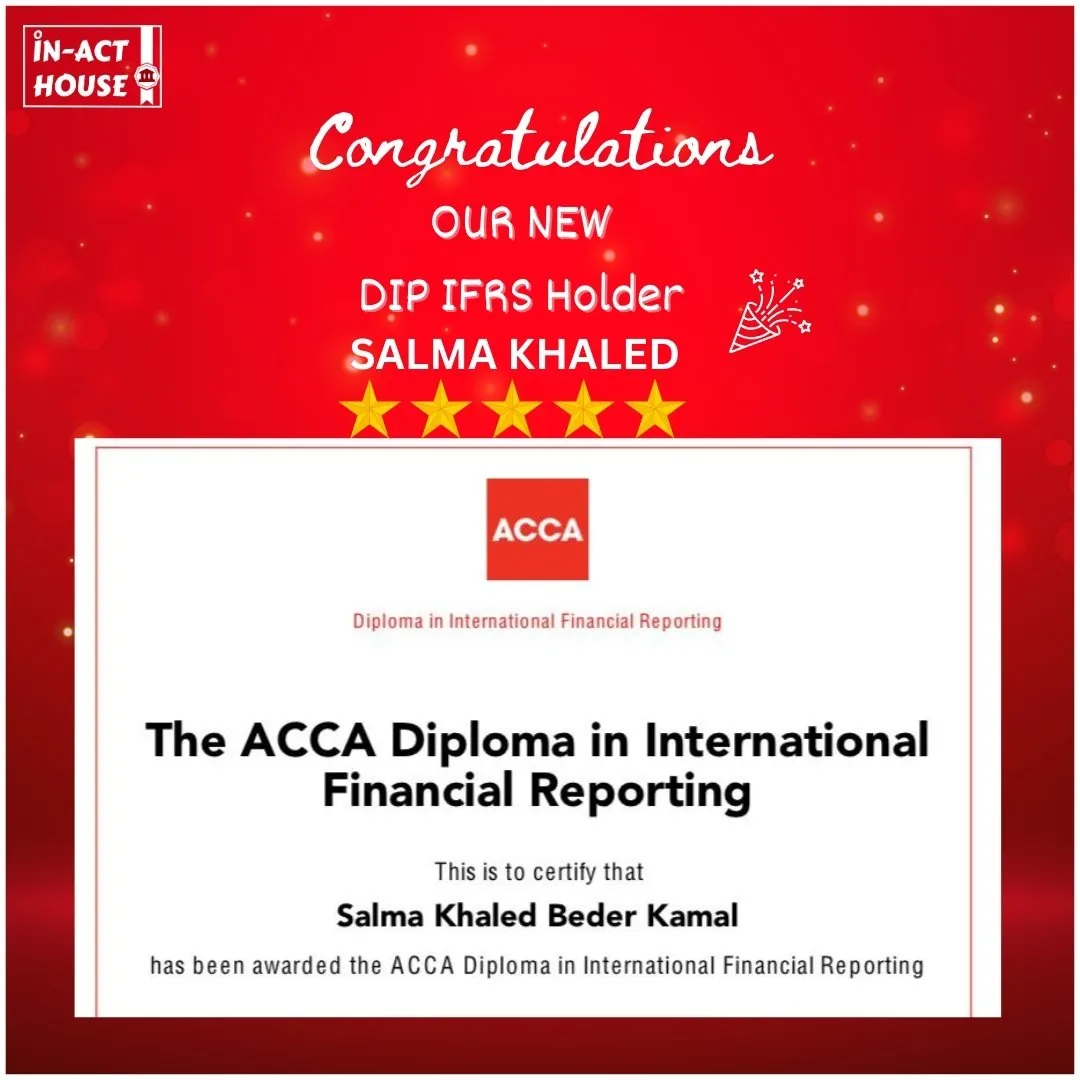IFRS DIPLOMA
-Certificate Provider :
ACCA (the Association of Chartered Certified Accountants) is one of the most reputable global associations for accountants. they aim to enhance the financial management sector by providing a global recognized ACCA qualifications that assure financial reporting excellence .
-Why to earn Dip IFR ?
If you are in the finance career you have to be familiar with IFRS ” the international financial reporting standards ” , this is critical for your career path because of the following reasons :
1- IFRS provides you with the knowledge and skills to understand the structure of the accounting framework , apply financial reporting standards , identify and prepare group financial statements .
2- Being DipIFR Holder guarantees you better opportunities in many countries , Over 113 countries require all listed companies to apply IFRS in their preparation of financial statements .
-The benefits of IFRS :
IFRS Accounting Standards address the challenge of enhancing transparency, accountability, and efficiency in financial markets globally. These standards achieve this by:
-Enhancing international comparability and quality of financial information:
IFRS Accounting Standards ensure that financial information is presented in a consistent and comparable manner across different countries and industries. This allows investors and other market participants to analyze and compare financial statements effectively, enabling them to make informed economic decisions.
-Bringing transparency:
IFRS Accounting Standards promote transparency by requiring companies to disclose relevant and reliable financial information. This transparency allows stakeholders to have a clear understanding of a company's financial position, performance, and cash flows. It also helps prevent fraudulent reporting practices and increases market confidence.
-Strengthening accountability:
IFRS Accounting Standards bridge the information gap between capital providers (investors) and capital users (companies). By providing transparent and reliable financial information, these standards enable investors to hold management accountable for their stewardship of the company's resources. This accountability encourages responsible financial management and reduces the risk of mismanagement or misuse of funds.
-Providing globally comparable information:
IFRS Accounting Standards serve as a common language for financial reporting, facilitating global comparability of financial statements. This comparability is essential for regulators, investors, and other stakeholders in assessing the financial health and performance of companies operating in different jurisdictions. It also simplifies the process of cross-border investment and reduces reporting costs for multinational companies.
-Contributing to economic efficiency:
IFRS Accounting Standards help improve capital allocation by providing investors with a comprehensive view of opportunities and risks across the world. This enables investors to make informed investment decisions, allocate capital efficiently, and drive economic growth. Additionally, the use of a single accounting language reduces the cost of capital for businesses and streamlines international reporting, leading to increased efficiency and reduced financial barriers to entry in global markets.
This course includes:
100 Hours of Lessons
25 LECTURES
All SKILL levels
Certificate of Completion
Recorded Videos
Exam practice
Online & Offline Available
What You Will Learn
Section One: Conceptual and regulatory framework.
Section Two: Elements of financial statements.
Section Three: Presentation and additional disclosures.
Section Four: Consolidated financial statements.
Course Curriculum
This is exactly what will be covered in this course
-
The International Accounting Standards Board (IASB) and the regulatory framework
-
Revenue recognition
-
Property, plant and equipment
-
Impairment of assets
-
Leases
-
Intangible assets and goodwill
-
Inventory
-
Financial instruments and fair value measurement.
-
Accounting for employment and post-employment benefits
-
Tax in financial statements
-
The effects of changes in foreign currency exchange rates
-
Share-based payment
-
Exam practice.
-
Presentation of the statement of financial position, and statement of profit or loss and other comprehensive income
-
Accounting policies, changes in accounting estimates and errors and SMEs.
-
Events after the reporting date , Related party disclosures
-
Earnings per share
-
Operating segments
-
Exam practice.
-
Preparation of group consolidated external reports
-
Business combinations – intra-group adjustments
-
Business combinations – fair value adjustments
-
Business combinations – associates and joint arrangements
-
Business combinations – exam practice.
-
Exam practice.
-
Introduction to User Experience Design
-
Introduction to User Experience Design
-
Introduction to User Experience Design
-
Introduction to User Experience Design
-
Introduction to User Experience Design
-
Introduction to User Experience Design
Write a very short description about the lesson here so that your visitors know what they are going to learn in this lesson.
05:00
Write a very short description about the lesson here so that your visitors know what they are going to learn in this lesson.
05:00
Write a very short description about the lesson here so that your visitors know what they are going to learn in this lesson.
05:00
Write a very short description about the lesson here so that your visitors know what they are going to learn in this lesson.
05:00
Write a very short description about the lesson here so that your visitors know what they are going to learn in this lesson.
05:00
Write a very short description about the lesson here so that your visitors know what they are going to learn in this lesson.
05:00
Exam Details
The Diploma in International Financial Reporting (DipIFR) is assessed by a single three-hour, 15 minute computer-based exam. You will need to achieve a 50 per cent mark or above to pass the exam.
Exam Dates
From the June 2024 exam session, you can choose which date you would like to attempt your Diploma in International Financial Reporting exam.
The exam will be held on both 6 June 2024* and 7 June 2024. Please select the date you prefer when making your entry.
In order to sit exams at a specific session, you will need to register for the DipIFR qualification online and upload all supporting documentation by the following registration closing date:
-8 April 2024 (for the June 2024 exam session)
-7 October 2024 (for the December 2024 exam session)
-Once registered you have until 29 April 2024 (June exam session) and 28 October 2024 (December exam session) to access the exam planner via your myACCA account and enter for the exam.
Exam fees
180 £
Our successful students



Our Students review







Contact
For Calls or WhatsApp inside Egypt : 01067067856
For Calls or WhatsApp outside Egypt : +201067067856
© 2020 Inact house. All Rights Reserved.






